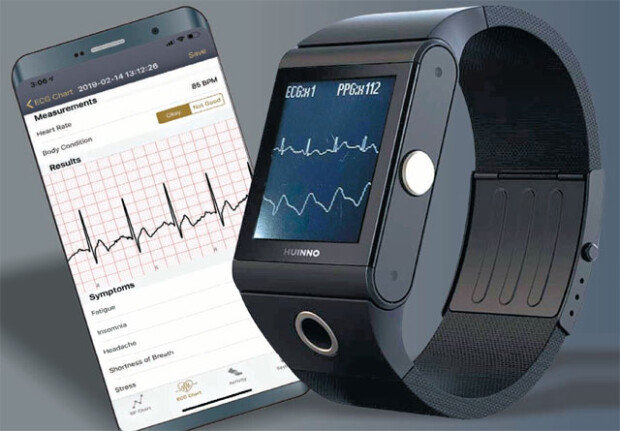Gov't deregulation made for digital healthcare startups
Gov't deregulation made for digital healthcare startups
Posted February. 15, 2019 09:28,
Updated February. 15, 2019 09:28

Patients in Korea will be able to send ECG data measured by a smart watch to a healthcare service institution and receive medical counsel. Deregulation measures also allow institutions to recruit clinical trial participants as well as public service agencies to send public documents such as fines, and notice of military duty to citizens.
The government has chosen digital healthcare as the first area of business to undergo regulatory sandbox in the ICT business. The Ministry of Science and ICT approved three areas of business (four business service providers) Thursday at the first New Technology/Service Deliberation Committee meeting held at the Gwacheon government complex in Gwacheon. The ministry also announced that it would apply the easing to other service providers as well, apparently conscious of public opinion criticizing selective approval for certain applicants.
Huinno, one of the four approved service providers, was mentioned by President Moon Jae-in at a cabinet meeting held on Tuesday as "an example of a business that went commercial later than other global competitors because it was tied down by regulations." The company developed a smart watch that measured ECG data in 2015, but was not able to launch the product on the local market for more than three years, eventually being overtaken by Apple 4 in last September.
“Though the launch is later than we hoped for, the government’s new regulations will provide a foothold for Korea to dominate the healthcare big data industry,” said Gil Young-jun, the CEO of the company. The IT software market for the healthcare industry, spearheaded by AI and big data, is significantly larger than the IT hardware market.
Huinno‘s smart watch, which was launched as a test product four years ago, will become Korea’s first wearable medical device to be certified by the Ministry of Food and Drug Safety. The Ministry of Science and ICT also paved way for the company to work with the Korea University Hospital to leverage ECG data for business opportunities by analyzing the data of some 2,000 patients. With frequent monitoring of ECG data by the smart watch, however, patients with light symptoms can be guided to primary and secondary care providers, while those with severe symptoms can be advised to visit larger hospitals.
“It will improve convenience of the patient and allow opportunities to occupy an early foothold in the ECG big data service business," said the CEO. "The approval is significant for Korea’s healthcare data industry."
Separately, the government decided to make authoritative interpretation that approves all service providers involved in the "online clinical test brokerage business," instead of granting exclusive approval to Olive Health Care, the digital healthcare start-up that initially applied for approval. The new measure is expected to bring more efficiency in recruiting clinical test participants, which had been restricted to newspaper and metro ads and the test clinic’s website, thus accelerating new drug and product development.
Dong-Jin Shin shine@donga.com



![[단독]점유율 뚝-계약 줄취소…배터리도 구조조정 시사](https://dimg.donga.com/c/138/175/90/1/wps/NEWS/IMAGE/2026/01/15/133159957.1.jpg)
![[단독]“물건 보냈는데 돈 안와”… 국제정세 불안에 수출대금 8000억 떼일 위기](https://dimg.donga.com/c/138/175/90/1/wps/NEWS/IMAGE/2026/01/15/133160131.1.jpg)

![[송평인 칼럼]군 통수권자의 최소한의 자격](https://dimg.donga.com/c/138/175/90/1/wps/NEWS/IMAGE/2026/01/14/133159775.1.jpg)
